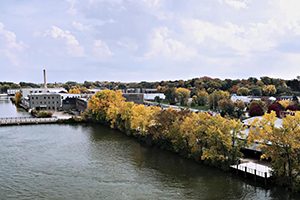
School of Journalism and Mass Communication students created strategic messaging tools, including a mission and vision statement, social media plans, external communication strategy, brand book, and logo, to help reflect a new identity for Polk County’s future Book 1: https://uwmadison.box.com/s/d5o4fb6s208g8v726j5g1c5tu8ljjcvrBook 2: https://uwmadison.app.box.com/file/1228838544870?s=4loebz05b0tdpfk74lnt928hvbdjxwzw UniverCity Year Contact Info: UniverCityAlliance@wisc.edu […]
Read More… from Creating campaign message materials to rebrand Polk County

The county wants to revive its sustainability in order to reduce its impact on the environment and save money. To move beyond addressing energy efficiency efforts, this report assesses Outagamie County’s current state of sustainability management and recommendations for jumpstarting the county’s Sustainability Committee. UniverCity Year Contact Info: UniverCityAlliance@wisc.edu Report Link […]
Read More… from Conducting a sustainability management assessment for Outagamie County departments

This report presents conservation and sustainability initiatives addressing land and water conservation, renewable energy, transportation, food sustainability, and sustainable development that can be implemented on the county level with the support of government, nonprofit, and commercial organizations. UniverCity Year Contact Info: UniverCityAlliance@wisc.edu […]
Read More… from Exploring county-level conservation and sustainability initiatives for Outagamie County

A team of capstone students prepared recommendations that Outagamie County can use to electrify the public transportation sector. These include establishing a charging rebate program, changing building codes and zoning permits, staying updated on state and federal funding opportunities, and creating a committee of stakeholders to stay engaged on the issue. UniverCity Year Contact Info: […]
Read More… from Guiding Outagamie County policy and regulatory framework to support electric vehicles

Outagamie County’s growth from a rural to a suburban and urban county means that some highways need to change speed limits and other regulations that control how cars access them. This project offered recommendations to modernize Outagamie County’s highway access control ordinance, which has not been updated in over 30 years, and analyzed crash data […]
Read More… from Modernizing the Outagamie County highway access control ordinance

This project explores the configuration, size, and location of a microgrid, energy storage, sustainability, and expandable solutions. Students ultimately recommended installing a solar farm near the airport terminal. UniverCity Year Contact Info: UniverCityAlliance@wisc.edu […]
Read More… from Planning for a microgrid at the Appleton International Airport

Four groups of students created unique geothermal system design proposals for the Appleton International Airport that would would support at least 25% of total heating and cooling demands in passenger terminal and ancillary buildings. Team Alpha design solution: https://uwmadison.box.com/s/2c1lmmqh1fcqg7qymkxgx27dwa4449siTeam Delta design solution: https://uwmadison.box.com/s/kddj4nu9u775hj37nqclmo2efb9c6bn2Team Epsilon design solution: https://uwmadison.app.box.com/file/1221574087918?s=nq1fskzrjlcyknwfy2d2uj8m2pfb29urTeam Omicron design solution: https://uwmadison.box.com/s/5g8y0vbbodcvcreypv2pwlvj0qlihgua UniverCity Year Contact Info: […]
Read More… from Exploring community geothermal for Appleton International Airport

This report proposes solutions that the airport can implement to expand its sustainability goals to achieve net zero energy including airport vehicle and equipment electrification, on-site solar photovoltaic installations, on-site anaerobic digestion and zero waste, inland offshore wind farm and on-site vertical axis wind turbines, water conservation and reywater use, investments in utility scale renewable […]
Read More… from Developing a net zero energy plan for Appleton International Airport

In 2011, Appleton International Airport (ATW) was one of 10 airports selected nationally by the Federal Aviation Administration (FAA) to participate in an initial Sustainable Master Plan Pilot Program. That program resulted in a Sustainability Plan developed in 2012. Approximately 85% of the 2012 SustainableMaster Plan initiatives have been completed and ATW is now developing […]
Read More… from Expanding the action plan for new sustainability initiatives at the Appleton International Airport

